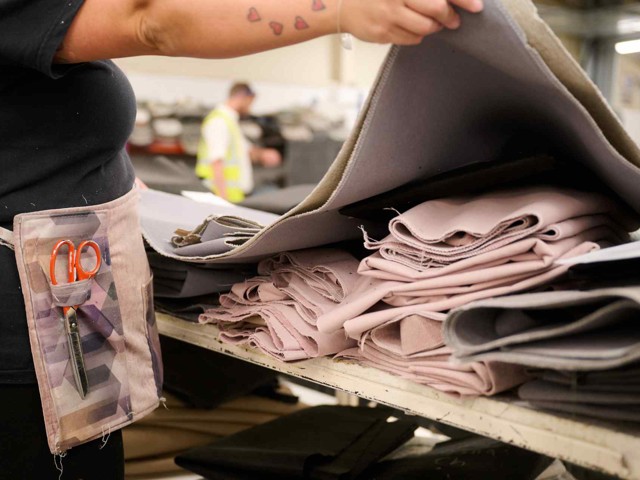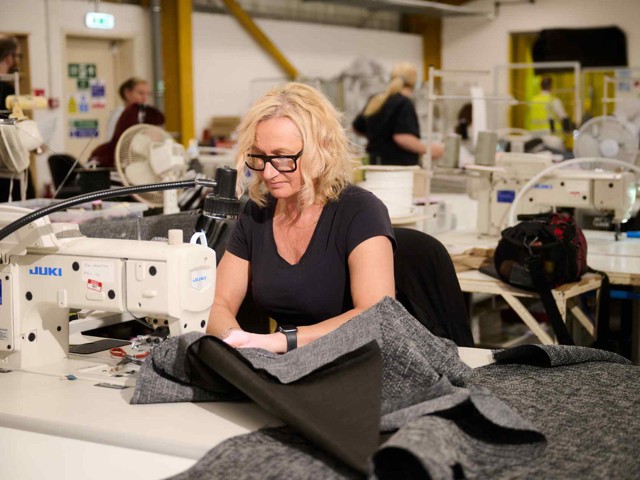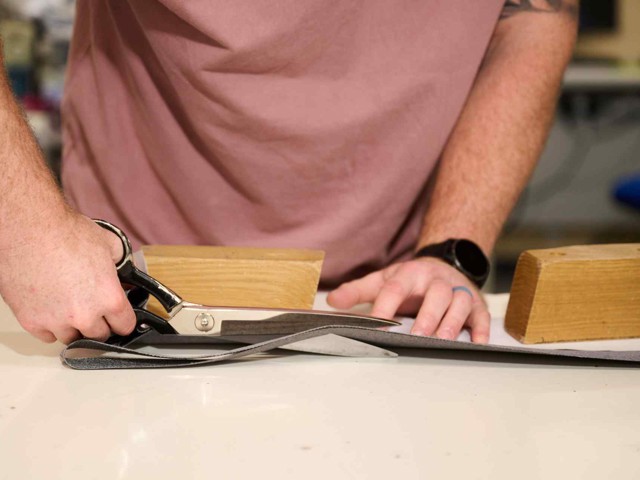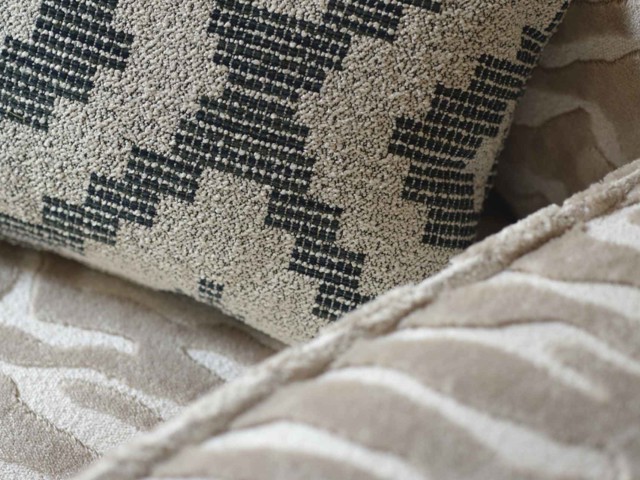
In This Together
We’ll only achieve our sustainability ambitions if we work in partnership with our supply chain. We seek to support suppliers by adopting best practices in our operations and manufacturing.

Our approach
Our Sustainable Sourcing Policy sets out seven high-level principles for suppliers to follow, underpinning both the minimum standards we expect them to meet and DFS’ approach. It is applicable to our entire supply chain globally and covers:
The requirement for suppliers to act in an ethical manner;
Protecting human rights;
Supporting our suppliers and partners;
Delivering value to our customers and shareholders;
Taking responsibility for our impact on the environment;
Being fair and transparent with suppliers, including how information is used; and
Championing sustainable innovation in our industry.
Find out more about our approach to human rights in the supply chain.
Timber is an essential part of furniture and used in 99% of our products. Though it is a renewable resource, irresponsible consumption can contribute to deforestation and reduce the removal of carbon from the atmosphere. We’re determined to only use legally, sustainably sourced timber from responsibly managed forests. All our timber supply chains are fully audited to establish they were legally sourced and did not contribute to deforestation. We require all timber to come from certified supply chains, such as FSC®1 or PEFC2 with chain of custody, to ensure responsibility and transparency at all tiers of the supply chain. Our process of full supply chain due diligence is helping to protect forests and nature for generations to come.
DFS Furniture PLC incorporating DFS Trading Ltd T/A DFS and Sofology Ltd T/A Sofology FSC® License holder FSC-C192921
PEFC/16-44-2518
Target
Sustainably sourced timber (certified FSC & PEFC) used in all products by Dec 2025
Progress
93%
Leather is a natural resource, derived from waste in the food industry. It provides customers with a resilient, long-lasting material and is also biodegradable at the end of its life. However, the beef industry is linked to deforestation, and leather production uses significant amounts of water and chemicals in the treatment of hides. We have therefore established clear guidelines for our value chain on the sourcing and treatment of leather. All supplies are traced back to farms to ensure they are not linked to deforestation, and all hides should be sourced from Leather Working Group (LWG) tanneries and curers.
LWG is a global body established to set standards in the leather industry around social impact, water governance, and resource use. Our target is to ensure that the second and third actors within a leather supply chain operate to these standards. DFS is a member of the LWG and its Traceability Working Group.
Target
All leather used on upholstery sourced from supply chains with LWG certification by Dec 2025
ACHIEVED
Target was achieved Dec 2024
Textiles can have a significant impact on the environment, both as a raw material and because of the chemicals and water used in manufacturing. Additionally, labour rights are a key risk in the textile industry. We rely on a number of certifications, embedded in the supply chain at source and mill, to ensure we procure textiles responsibly.
The Group requests that all textile mills producing upholstery fabrics obtain OEKO-TEX STeP certification – a holistic audit that champions responsible production. Although less than 9% of our fabrics include cotton, we have specified that all cotton should be sourced from Better Cotton (BC) partners. BC seeks to address water use and labour rights by ensuring certified actors operate ethically and responsibly.
To encourage the upholstery industry to become more sustainable, our ambition is to stimulate innovation. At present, recycled textiles are significantly more expensive than virgin materials and often have a poorer performance and feel, causing customers to reject them. This is at odds with our goal to become a circular business. So, we’re trying to drive change by setting a requirement for suppliers to introduce recycled textiles.
Target
20% of all NEW textiles contain recycled content by June 2027
Progress
4%
Single-use plastic is an important issue for our stakeholders, and we aim to increase the amount of recycled content in packaging to ensure our suppliers support circular practices. While we transition them all to at least 30% recycled material to alleviate the UK plastic packaging tax, we want to go further and ensure at least 50% of our plastic packaging contains 50% recycled content.
Target
50% of all plastic packaging will contain 50% recycled content by June 2026
Progress
14%
Timber is an essential part of furniture and used in 99% of our products. Though it is a renewable resource, irresponsible consumption can contribute to deforestation and reduce the removal of carbon from the atmosphere. We’re determined to only use legally, sustainably sourced timber from responsibly managed forests. All our timber supply chains are fully audited to establish they were legally sourced and did not contribute to deforestation. We require all timber to come from certified supply chains, such as FSC®1 or PEFC2 with chain of custody, to ensure responsibility and transparency at all tiers of the supply chain. Our process of full supply chain due diligence is helping to protect forests and nature for generations to come.
DFS Furniture PLC incorporating DFS Trading Ltd T/A DFS and Sofology Ltd T/A Sofology FSC® License holder FSC-C192921
PEFC/16-44-2518
Target
Sustainably sourced timber (certified FSC & PEFC) used in all products by Dec 2025
Progress
93%
Leather is a natural resource, derived from waste in the food industry. It provides customers with a resilient, long-lasting material and is also biodegradable at the end of its life. However, the beef industry is linked to deforestation, and leather production uses significant amounts of water and chemicals in the treatment of hides. We have therefore established clear guidelines for our value chain on the sourcing and treatment of leather. All supplies are traced back to farms to ensure they are not linked to deforestation, and all hides should be sourced from Leather Working Group (LWG) tanneries and curers.
LWG is a global body established to set standards in the leather industry around social impact, water governance, and resource use. Our target is to ensure that the second and third actors within a leather supply chain operate to these standards. DFS is a member of the LWG and its Traceability Working Group.
Target
All leather used on upholstery sourced from supply chains with LWG certification by Dec 2025
ACHIEVED
Target was achieved Dec 2024
Textiles can have a significant impact on the environment, both as a raw material and because of the chemicals and water used in manufacturing. Additionally, labour rights are a key risk in the textile industry. We rely on a number of certifications, embedded in the supply chain at source and mill, to ensure we procure textiles responsibly.
The Group requests that all textile mills producing upholstery fabrics obtain OEKO-TEX STeP certification – a holistic audit that champions responsible production. Although less than 9% of our fabrics include cotton, we have specified that all cotton should be sourced from Better Cotton (BC) partners. BC seeks to address water use and labour rights by ensuring certified actors operate ethically and responsibly.
To encourage the upholstery industry to become more sustainable, our ambition is to stimulate innovation. At present, recycled textiles are significantly more expensive than virgin materials and often have a poorer performance and feel, causing customers to reject them. This is at odds with our goal to become a circular business. So, we’re trying to drive change by setting a requirement for suppliers to introduce recycled textiles.
Target
20% of all NEW textiles contain recycled content by June 2027
Progress
4%
Single-use plastic is an important issue for our stakeholders, and we aim to increase the amount of recycled content in packaging to ensure our suppliers support circular practices. While we transition them all to at least 30% recycled material to alleviate the UK plastic packaging tax, we want to go further and ensure at least 50% of our plastic packaging contains 50% recycled content.
Target
50% of all plastic packaging will contain 50% recycled content by June 2026
Progress
14%
| Title | Document |
|---|---|
|
Sustainable Sourcing Policy |
Download document |
|
Biodiversity Policy |
Download document |
|
Group Water Policy |
Download document |
|
Group Leather Policy |
Download document |
|
Group Timber Policy |
Download document |
| Title | Document |
|---|






